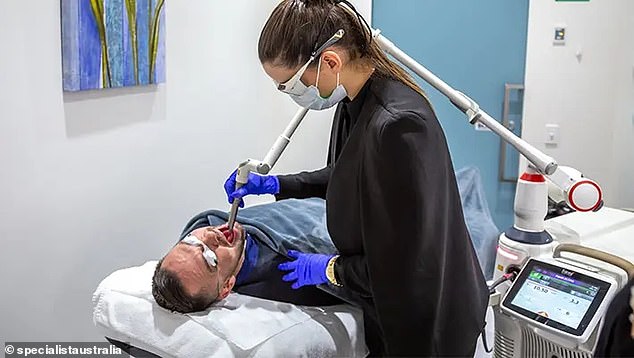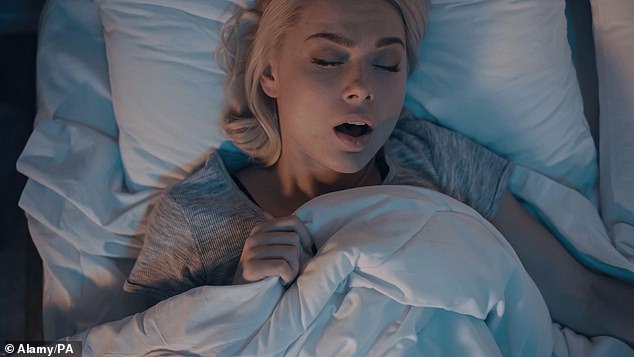How a Laser Beam in the Throat Can Stop Snoring and Help People Sleep Happily Again
Snoring could be cured by shooting a laser into the throat.
The treatment is thought to work by warming the soft tissue in the throat, causing changes that make the throat firmer and stop it from vibrating during sleep.
A recent study of more than 70 snorers found that after three sessions, about 70 percent of participants stopped snoring, according to research published in the International Archives of Otorhinolaryngology.
A new study of the treatment is currently being conducted in Portugal, at the University Institute of Health Sciences, comparing the treatment with a placebo.
Snoring is usually caused by the soft tissues in the mouth, throat, or airway vibrating as air passes through during breathing during sleep.
In some cases, snoring is linked to obstructive sleep apnea, where the airways temporarily collapse during sleep. Risk factors include being overweight, sleeping on your back, drinking alcohol, and smoking.
In addition to lifestyle changes, treatment depends on the cause. For example, a special mouthguard can move the tongue forward to prevent it from blocking the airway.
Snoring is usually caused by the soft tissue in the mouth, throat, or airway vibrating when air passes through it as people breathe during sleep (stock)

The treatment is thought to work by warming soft tissue in the throat, triggering changes that firm up the throat and stop it from vibrating during sleep (stock)
The new Yag laser treatment was performed on 76 patients between the ages of 50 and 70 who snored but did not suffer from sleep apnea.
The laser uses a low temperature. In the past, higher temperatures have been used to remove excess soft tissue to treat snoring. However, there have been reports of bleeding, pain and scarring.
After a numbing gel is applied, the handheld device is placed in the mouth with the tip approximately 3 cm from the targeted tissue at the back of the throat. Patients have three 15-minute sessions, spaced two weeks apart.
Results showed that 52 of the trial participants (68.4 percent) stopped snoring, while 24 (31.6 percent) experienced a slight improvement. Before the trial, ten were rated as ‘epic’ snorers, with the nighttime noise having driven their partner out of the bedroom. Six improved so much that they were able to welcome their partner back.
Two-thirds of the participants (65.2 percent) even stopped snoring two years after treatment.

In some cases, snoring is linked to obstructive sleep apnea, where the airways temporarily collapse during sleep (stock)
It is thought that the combination of light and heat stimulates an increase in fibroblasts, cells that produce collagen, a protein that gives tissues their structure: this strengthens the soft tissue and causes it to contract, making it less likely to collapse during sleep.
“Our study shows that using the Yag laser to tighten the soft palate yielded good results,” said the Cairo University otolaryngologists who led the study. No postoperative complications were reported.
Jaydip Ray, ENT specialist and professor of otology and neurotology at the University of Sheffield, commented on the research: ‘This is an exciting development in non-invasive options for treating snoring.
‘The current research is promising, but it concerns a small number of users.
“It is very important to see more long-term results in a larger number of patients.”
Stimulating the nerve under the tongue may address snoring and sleep apnea, reports the Journal of Clinical Sleep Medicine.
In 15 snorers who had an electrical device implanted in their chests (which gently stimulates the nerve that controls the tongue and other airway muscles), the number of times they stopped breathing fell from an average of 35 per hour to 11.2.
According to researchers at the University of Regensburg in Germany, the number of snorers has been halved, as has the level of irritation of partners due to snoring.
